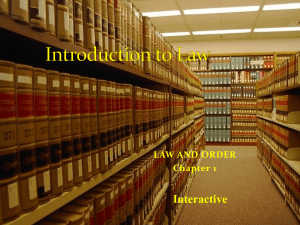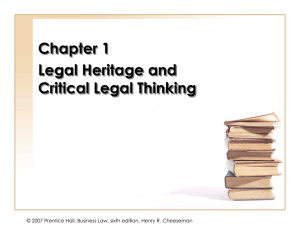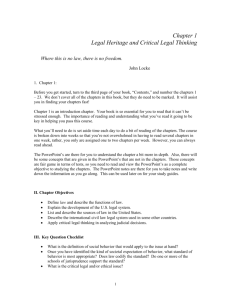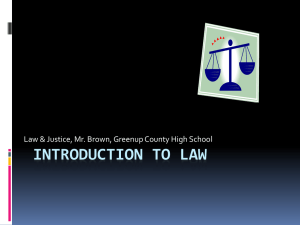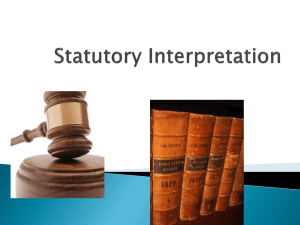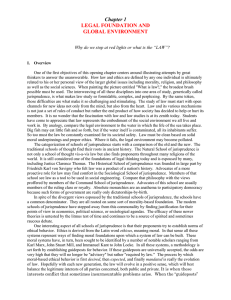Chapter 1 BA 18
advertisement
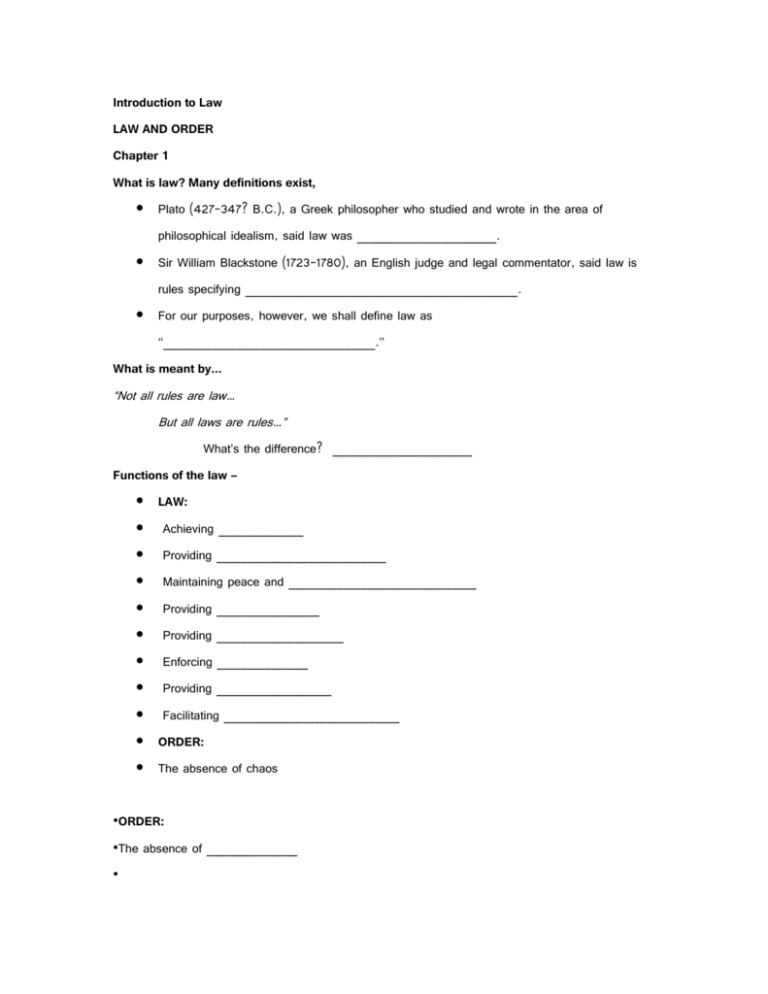
Introduction to Law LAW AND ORDER Chapter 1 What is law? Many definitions exist, Plato (427-347? B.C.), a Greek philosopher who studied and wrote in the area of philosophical idealism, said law was _______________________. Sir William Blackstone (1723-1780), an English judge and legal commentator, said law is rules specifying _____________________________________________. For our purposes, however, we shall define law as ‘‘___________________________________.’’ What is meant by… “Not all rules are law… But all laws are rules…” What’s the difference? _______________________ Functions of the law – LAW: Achieving ______________ Providing ____________________________ Maintaining peace and _______________________________ Providing _________________ Providing _____________________ Enforcing _______________ Providing ___________________ Facilitating _____________________________ ORDER: The absence of chaos •ORDER: •The absence of _______________ • DUTIES IN A SOCIETY: Torts: Remedies: Crimes: WHY STUDY LAW? THE LAW AS AN ARTIFICIAL LANGUAGE SYSTEM: Law has it’s _________________________: Legal terms may appear to be synonymous with everyday words, but they are not. Legal terms may have more than _____________________________. Some legal terms have no relation to ______________________ language. Jurisprudence- “Wisdom of the law” The law continues to change, and knowledge of the legal philosophies will improve your ability to understand the law and predict the future trends. Need To Be ______________________a. The law must be flexible so that it can be applied to many different individual situations. b. Because of this flexibility, our legal system loses some of its predictability. Need To Be ___________________________a. The law must deal with real situations, not ones that are “thought” to be real. For example, disliking someone is not a crime. b. Courts will avoid cases where the issue is moot or there is no real case and controversy. Need To Be _____________________________ – a. Laws must be published, publicized, and talked about openly. b. Laws must be posted and enforced c. Once a law is published, however, ignorance of the law is no excuse. Need To ___________________________a. There must be a final outcome and verdict to a case. b. There must come a day where there are no more appeals. c. The U.S. Supreme Court must be the final say in any case that has been appealed in the lower courts and has worked its way up to the Supreme Court. d. Without the ability to end a case, the case would be ongoing, continuous and never ending. Theories of Law Philosophies held by society Jurisprudential Thought Schools of Jurisprudential Thought •Analytical school - •Command school - Believes that law is a ________________________ developed, communicated, and enforced by the ruling party. •Critical legal studies school - Believes ______________________________ and that legal disputes should be solved using rules of fairness •Feminist school - Believes a _______________________ should be considered when laws are developed, interpreted, and applied •Historical •Law school - Believes law is an _______________________________________ and economics school - Believes ___________________________ should be the central concern of legal decision making •Sociological school - Believes law is a means of ______________________ certain sociological goals •Natural –Law school - Postulates that law is based on what is “__________________________________”. should be based on morality and ethics. ___________________________. Sources of Law in the United States The Doctrine of _________________________ •Based on the common law tradition, past court decisions become ______________for deciding future cases. •Lower courts follow the precedent established by higher courts. The Doctrine of Stare Decisis (continued) •Both federal and state courts follow the precedents established by ________________________________________ •Courts in one jurisdiction are not bound by precedent of another jurisdiction, but may look at it for guidance . Priority of Law in the United States •The U.S. Constitution and treaties _________________________ over all other laws. •Federal statutes take precedence over federal regulations. •Valid federal law takes precedence over conflicting state or local law. Priority of Law in the United States (continued) •State constitutions rank as the highest state law. •State statutes take precedence over state regulations. •Valid state law takes precedence over local laws. Critical Legal Thinking •The process of: –specifying the issue presented by a case –identifying the key facts in the case and applicable law –applying the law to the facts – reaching a conclusion that answers the issue presented
